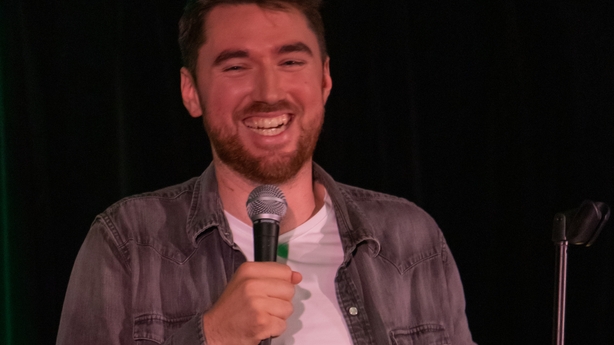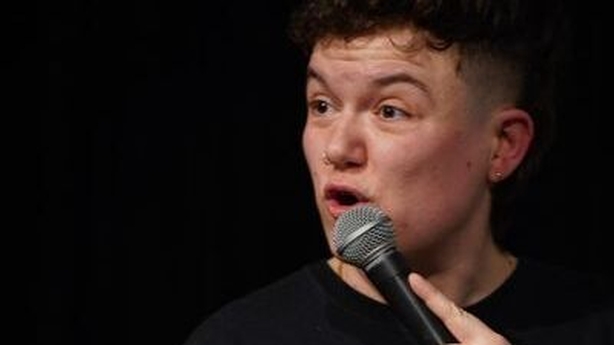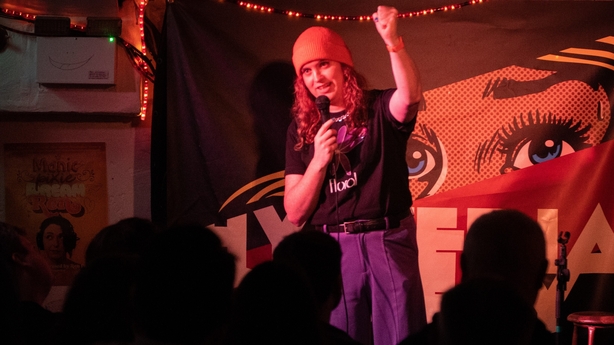Proposed new legislation on hate speech is currently progressing through the Oireachtas and "anyone funny should be worried", said Eddie Mullarkey. He runs the Craic Den comedy club in Dublin.
Like many people with concerns about Minister for Justice Helen McEntee's Bill, Mr Mullarkey is worried about what he sees as a lack of clarity in its wording.
"It doesn’t define 'hate’ in the bill, which leaves it up to a judge to get a joke. One of the terms used in this legislation as a ground for prosecution is ‘grossly trivialising’ a subject, and that’s very ambiguous," he said.
Some, including Kevin Larney who runs the Penny Comedy Club in Dublin, are less concerned.
"Legislation is just going to stop people really trying to spread hate or violence. I don't think any comedian will be in danger of losing their job over it," he told Prime Time.
Ireland is one of the few countries in Europe currently without similar laws. Under the draft legislation, it would be an offence to be considered "condoning, denying or grossly trivialising genocide, war crimes, crimes against humanity and crimes against peace."
The Incitement to Hatred and Hate Offences Bill aims to update the previous legislation, which dates back to 1989.
"This is a really positive piece of legislation," Minister McEntee said on Prime Time in recent weeks. "What we're doing here in terms of hatred and hate speech is we are updating legislation that isn't workable."
She said the emergence of social media in the intervening decades makes updating the law a necessity.
Under the proposals, a person found guilty of an offence could be liable for a fine, or imprisonment for up to five years. Some critics of the bill are concerned that it will curb freedom of expression and want to see it redrafted.
Others believe new legislation on hate speech generally is unnecessary.

Senator Michael McDowell previously told Prime Time: "We have to be very careful that we don't extend criminal liability to areas [such as] argumentative free speech, insulting free speech, demeaning free speech, and the like."
In some countries where hate-speech laws exist, certain people have faced prosecution for what they considered acts of comedy.
In 2018, a Scottish court found a YouTuber, Mark Meechan, guilty of a hate crime for publishing a video of his dog, which he had trained give Nazi-style salutes in response statements about the Holocaust. He was fined £800.
Meechan said the video was intended to be funny. In sentencing, Sheriff Derek O'Carroll said "the description of the video as humorous is no magic wand".
At the time, a number of high-profile comedians and academics made comments opposing the prosecution, and several hundred people attended anti-censorship protests in London on foot of it.
Mr Meechan later entered politics, contesting the 2018 European elections for the UK Independence Party.
In Canada, comedian and podcaster Mike Ward was ordered to pay $42,000 [€29,000] in damages by the Quebec Human Rights Tribunal in 2016 following a complaint to the human rights commission by the family of disabled singer, Jeremy Gabriel.
Between 2010 and 2013, the singer, who has Treacher Collins Syndrome, was the subject of Mr Ward's jokes during the comedian's shows. Treacher Collins Syndrome is a congenital condition that causes abnormalities in the bone structure of the face.
Among other things, Mr Ward said Mr Gabriel was a lousy singer, but since he was terminally ill, which he was not, he should be allowed to live out his dream.
The tribunal ruled that Mr Ward had infringed on Mr Gabriel's right to have his disability, honour, and reputation safeguarded without discrimination.
The comedian appealed the findings to Canadian Supreme Court, which overturned the original order in 2021.
Cases like these have led to some concern among comics in Ireland that similar prosecutions could be taken here.
"If I go up and talk about [controversial] stuff it’s all jokes. From a stand-up perspective, if someone humiliates themself, that's punishment enough," said Nigerian-born Irish comic Emman Idama.
"We should police ourselves."
He said that an audience should be the deciding factor between what is acceptable and what is not, and that jokes in poor taste will be met with silence from a crowd.
But others see it very differently.
"An audience not laughing doesn't make it any less okay," said Sinéad Walsh.
As a member of the LGBT community, they believe that for a wide variety of reasons the legislation is needed.
They also said elements of hate speech already exist in Irish comedy.

"I've heard comedians use slurs," they said, adding that one recent open mic performance they attended was "the first time in a comedy club I genuinely felt unsafe".
"This individual had gone on a rant about how feminists were ruining the lives of men, describing the violent actions he wished he could act on them.
"When the intent of speech is to cause harm there should be protections," they said.
Another voice from the LGBT community with opinions on the legislation is Allie O'Rourke.
Allie is a transgender comedian and said the bill is "something comedians will be afraid of."
She is a member of the Hysteria Comedy Collective, which was set up on the principle of "platforming original, unique and underrepresented voices".

"The comedy club I run has a code of conduct," she said, saying the club has no tolerance for discrimination.
She supports plans to update hate speech legislation but believes legislating on the topic "is complicated".
"What are we doing to address the cause of hate speech?" she asked.
"I've heard some very transphobic comments and thankfully I get to go up on stage after and correct the record."




